Chandigarh, April 8, 2025 — Chronic inflammation is increasingly recognized as a root cause of many serious health conditions—from heart disease and diabetes to arthritis and even cancer. But according to health experts, what we put on our plates every day can play a powerful role in lowering inflammation and preventing long-term damage.
Anti-inflammatory foods, rich in antioxidants, vitamins, and healthy fats, have gained growing attention among nutritionists and researchers for their potential to counteract the body’s inflammatory response. These natural dietary choices may not only reduce the risk of disease but also promote energy, better sleep, and improved immunity.
What Is Inflammation?
Inflammation is the body’s natural response to injury, infection, or harmful stimuli. It helps heal wounds and fight off pathogens. However, when inflammation becomes chronic—lingering over time due to factors like stress, poor diet, pollution, or a sedentary lifestyle—it can damage healthy tissues and trigger a range of health issues.
“Chronic inflammation is like a slow-burning fire in the body,” said Dr. Meera Sharma, a clinical nutritionist based in Delhi. “It can silently contribute to conditions like cardiovascular disease, type 2 diabetes, autoimmune disorders, and even some cancers.”
Key Anti-Inflammatory Foods
While medications and lifestyle changes can help manage inflammation, diet remains one of the most accessible and powerful tools. Experts recommend incorporating the following foods into daily meals:
Fruits and Vegetables: Berries, oranges, leafy greens, tomatoes, and cruciferous vegetables like broccoli and cauliflower are high in antioxidants and phytochemicals that combat oxidative stress.
Whole Grains: Brown rice, quinoa, and oats contain fiber that supports gut health and helps reduce inflammation.
Healthy Fats: Olive oil, avocados, nuts (especially walnuts and almonds), and seeds (like flaxseeds and chia) provide omega-3 fatty acids that are well-known for their anti-inflammatory benefits.
Fatty Fish: Salmon, mackerel, and sardines are rich in EPA and DHA, omega-3 fatty acids that directly lower levels of inflammatory markers in the body.
Spices and Herbs: Turmeric, ginger, garlic, cinnamon, and black pepper have shown anti-inflammatory properties in several studies.
“Adding turmeric to your food or drinking green tea regularly can go a long way in keeping inflammation in check,” noted Dr. Sharma.
What to Avoid
Equally important is minimizing foods that can trigger or worsen inflammation. Processed meats, refined carbohydrates (like white bread and pastries), sugary beverages, and trans fats have all been linked to higher levels of inflammation.
“Ultra-processed foods, high sugar intake, and excessive alcohol are major culprits,” said Mumbai-based dietitian Nikhil Mehta. “Even seemingly innocent snacks like chips or sugary cereals can fuel low-grade inflammation if consumed frequently.”
The Mediterranean Diet: A Model to Follow
Many nutritionists point to the Mediterranean diet as an ideal anti-inflammatory eating pattern. This diet emphasizes fruits, vegetables, whole grains, legumes, fish, olive oil, and moderate red wine, while limiting red meat and processed foods.
Several studies have linked the Mediterranean diet with lower risks of cardiovascular disease and cognitive decline, largely due to its anti-inflammatory effects.
Experts say that making even small changes to daily meals can have long-lasting health benefits. For instance, replacing white rice with brown rice, snacking on almonds instead of chips, or using olive oil in place of butter can help reduce inflammation over time.
“It’s not about perfection but about consistency,” said Mehta. “Incorporate more colorful produce, swap processed snacks for whole foods, and choose lean protein sources. Your body will thank you.”
While diet plays a central role, managing inflammation also involves other lifestyle choices. Regular physical activity, quality sleep, stress management, and avoiding smoking are crucial components of an anti-inflammatory lifestyle.
“Food is just one piece of the puzzle,” said Dr. Sharma. “When combined with good sleep, exercise, and mental well-being, the benefits multiply.”
Inflammation may be an invisible enemy, but the food we eat offers a visible and effective line of defense. By embracing an anti-inflammatory diet rich in wholesome, plant-based foods and healthy fats, individuals can reduce their risk of disease and improve overall health.
As Dr. Sharma summed up, “Let food be your medicine, and you’ll feel the difference not just today, but for years to come.”

